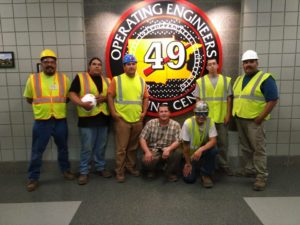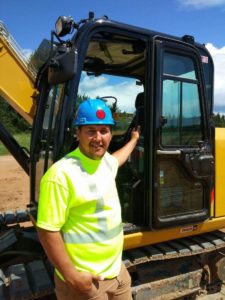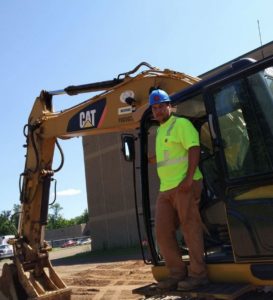Construction Career Lets Ricky Garbow Achieve Childhood Dream
By Sonja Mischke
In the summer, when the day was hot and school was a distant memory, when kids were racing to their local pools and playing until the sun went down, Ricky Garbow was dreaming about construction machines.
Although his friends would ask him to accompany them to the beach or park, Garbow would often stay behind, all so that he could watch the construction workers near his house dig holes with their giant excavators.
Though this may strike some as a strange place for a kid to spend a summer day, Garbow is clear that it’s exactly where he wanted to be.

“I thought those big machines were fascinating,” says Garbow. “I wanted to understand how it all worked, how those workers were able to create a structure from nothing, or manipulate the ground so easily with their tools. I would have given anything to try it myself.”
Little did he know that after many summers spent dreaming about it, he would get the chance.
Today, years later, Garbow is a 29-year-old heavy equipment operator, currently enrolled in the International Union of Operating Engineers (IUOE), Local 49, apprenticeship program. When he’s not operating an excavator or a bulldozer at a job site (such as building a road or a highway), you’ll fund Garbow at the Local 49’s training center in Hinckley, Minnesota, where he gets to operate off-road trucks, rollers, skid steers, bulldozers, scrapers, excavators, and front end loaders.

“I’m living my childhood dream,” says Garbow. “It’s the best choice I’ve made in my life, and I would recommend it to anyone. I get to operate the big machines I dreamed about as a kid, and I feel fulfilled in my job and career.”
The path to realizing his dream job, however, didn’t come easy. Unlike his friends who went to college or entered the military, Garbow didn’t know what he wanted to do after high school.
Although he now lives in Lindstrom, Minn., Garbow grew up in the Twin Cities as a member of the Mille Lacs Band of Ojibwe. While attending Unity High School in Balsam Lake, Wis., and he thought about pursuing a career as a nurse after graduating from high school. But something about college didn’t seem quite right.
“College wasn’t the right fit for me,” says Garbow. “I wanted to do something that would let me engage my mind, but also work with my hands, so I did some landscaping work, using skidloaders and laying rock. Then, my cousin gave me information about the TERO program, a six-week program in construction that program turned out to be a perfect fit.”
TERO stands for Tribal Employment Rights Office. There are ten TERO programs in the Great Lakes Region, which include the Red Lake Band, Bois Forte Band, the Ho-Chunk Nation, the Keweenah Indian Tribe, the Leech Lake Band, the Mille Lacs Band, the Oneida Tribe, the Stockbridge Munsee Community and the White Earth Band.
The first priority of TERO is to enforce the TERO Ordinance on or near each reservation by protecting Native American “preferential” employment and contracting, improving wages, training careers and contracting, and assisting businesses to achieve TERO compliance. TERO’s Job Skills Bank offers opportunities to learn landscaping, roofing, drywall, painting, plumbing, electrical, carpentry, welding, heavy equipment operation, road construction, security and labor both skilled and unskilled.
“My Uncle Dave was a 49er (member of the IUOE) for 35 years,” says Garbow. “I always looked up to him and so when I discovered construction through the TERO program, everything kind of fell into place.”
Garbow worked alongside 10 other students learning hands-on construction skills, and after those six weeks, Garbow secured a job with SM Hentges and Sons inc, which in turn, allowed him to join the IUOE and enter its apprenticeship program.
His new career has been a life changer.
“The benefits are unbelievable,” says Garbow. “I started building a pension from my first day on the job. I make good money, and I don’t have debt from college.”
“Going from landscaping to construction has been a complete 180,” says Garbow. “As a program apprentice, I am learning the skills I need to have a great career that will last me the rest of my life. I have a purpose and a direction for where I’m going.”
The apprenticeship program at the Local 49 Training Center teaches students how to apply their practical skills to the job, and gets students comfortable operating large machinery, and ready for a full career.
To become a journeyman, Garbow must complete 4,000 hours on the job, working under the direction of a journeyman, and 288 classroom hours.

“They make sure we’re trained in first aid and are CPR certified in the event that me or any one of my fellow union brothers need to provide emergency aid on a job site,” says Garbow. “We also train on real equipment at the Local 49 training center. They really focus on getting you to feel comfortable with the equipment and confident that you can do the job.”
Besides the positive experience Garbow has had with the apprenticeship program, he also says that being a part of a union has been its own reward.
“It’s a real brotherhood in the union,” says Garbow. “It’s an amazing thing, being with a group of people who are genuinely good at their profession. It doesn’t matter what trade you’re in, you’re able to take pride in your work.”
All around, Garbow’s career shift has changed his life for the better, but he cautions that a career in construction isn’t for everyone.
“You have to really know what you’re doing and have the interest in learning new things,” says Garbow. “You have to think carefully about how to safely use these big machines that we operate. When you’re a journeyman, no one is going to hold your hand.”
“I’m especially interested in getting more Native Americans involved in the work,” says Garbow. “There is a real opportunity for them in the trades, and I want to encourage them to learn more about it.”
Garbow says he would also encourage any high school student who is unsure about what path they want to pursue to check out apprenticeship programs and a career in construction.
“I had no idea what I wanted to do in high school,” says Garbow. “Now, instead of dreaming about big machines, I’m operating them, and the money I earn allows me to do all of the other things I love.”
To learn more about a career in construction, click here, and to learn more about apprenticeships in the trades, click here.
